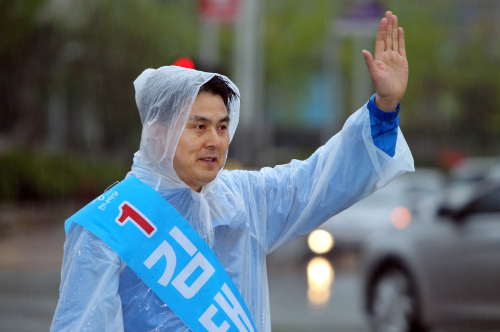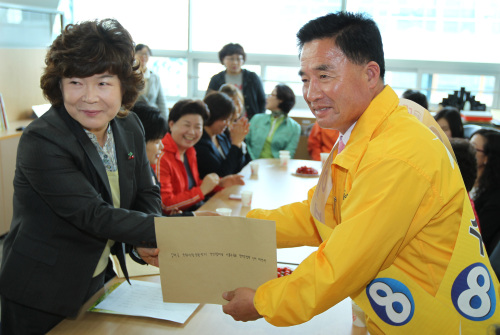[April 27 By-elections] ‘Roh factor’ runs high in Gimhae race
By 신혜인Published : April 22, 2011 - 19:40
Opposition candidate leading by small margin in ex-president’s birth place
This is the third and last of a three-part series on the April 27 by-election campaigns in three major electoral districts, Bundang-B, Gimhae-B and Gangwon Province. ― Ed.
Two people may be competing neck and neck for a legislative seat representing Gimhae, but a third person appears to be wielding the largest influence on the race. The third figure is former President Roh Moo-hyun, who was born and laid to rest in this small southeastern town.
Lee Bong-soo, an opposition bloc candidate who is running on the minority People’s Participation Party ticket, is a relatively little-known politician compared with his ruling party rival Kim Tae-ho. Pre-election polls predict, however, that the race will go down to the wire with the late president possibly playing the decisive factor.
Kim is ex-governor of South Gyeongsang who runs on the ruling Grand National Party’s ticket. For the 49-year-old right wing politician, winning the race would also mean recovering his reputation tarnished by a bribery scandal that forced President Lee Myung-bak to withdraw his plan last year to appoint Kim as prime minister.
This is the third and last of a three-part series on the April 27 by-election campaigns in three major electoral districts, Bundang-B, Gimhae-B and Gangwon Province. ― Ed.
Two people may be competing neck and neck for a legislative seat representing Gimhae, but a third person appears to be wielding the largest influence on the race. The third figure is former President Roh Moo-hyun, who was born and laid to rest in this small southeastern town.
Lee Bong-soo, an opposition bloc candidate who is running on the minority People’s Participation Party ticket, is a relatively little-known politician compared with his ruling party rival Kim Tae-ho. Pre-election polls predict, however, that the race will go down to the wire with the late president possibly playing the decisive factor.
Kim is ex-governor of South Gyeongsang who runs on the ruling Grand National Party’s ticket. For the 49-year-old right wing politician, winning the race would also mean recovering his reputation tarnished by a bribery scandal that forced President Lee Myung-bak to withdraw his plan last year to appoint Kim as prime minister.


Though small in size, the April 27 by-elections are considered especially important for several political big-names, such as Kim, who hopes to make a successful political comeback ahead of the presidential and parliamentary elections next year.
Results from the upcoming election, which will choose three parliamentary, one gubernatorial and six chiefs of smaller administrative units, are also expected to determine the fate of party leaders, who will use the race as a test of their political capacities.
Located in the southeastern Gyeongsang Province, Gimhae is the hometown of ex-President Roh, who leapt to his death from a mountain rock in 2009 amid a bribery probe involving his close relatives that many see as politically-motivated.
The suicide of the liberal leader, who prided himself as a clean politician, created a sense of guilt among left- and right-wingers alike. The sympathetic atmosphere continues to run strong in the district which usually favors the conservative ruling party.
Pre-election surveys show opposition candidate Lee, a former aide of Roh, is leading the race, though by a small margin of less than 4 percentage points.
Along with his ties to the late president, Lee, 56, has also been emphasizing the fact he is the sole candidate representing three liberal opposition parties as his main campaign strategy.
Local TV footage showed many young voters in the region supporting Lee, noting his ties to Roh as well as the minority opposition party led by Roh’s ardent supporters.
A Gimhae native, Lee supported Roh’s campaign during the 2002 presidential elections and served as deputy chief of the Korea Racing Authority from 2003 through 2005.
A well-liked politician in the Gyeongsang region, Kim has been focusing on personally meeting as many voters as he can during the campaign period, according to his aides.
Those who support the former governor claim he knows best about the needs of Gimhae residents.
Beginning his political career as an aide to a former lawmaker in his late 30s, Kim became the nation’s youngest mayor ever at the age of 40 by winning the election in Geochang, South Gyeongsang Province. Two years later, he became the governor of the province.
While Lee’s victory will hold greater meaning for his small liberal party and confidants of former President Roh in the general elections ahead, Kim’s victory will help him overcome a personal crisis that could have ended his political career.
Shortly after being nominated for prime minister in 2010, opposition lawmakers revealed several wrongdoings by the young politician including the questionable ties with a former businessman who was imprisoned for bribery.
With the two candidates running neck-and-neck, Kim may have a chance of winning the April 27 race depending on the turnout of voters, analysts say.
While the younger generation in their 20s and 30s generally supports the liberal party, older voters, especially in the Gyeongsang region, favor the conservative ruling bloc.
By Shin Hae-in (hayney@heraldcorp.com)


















![[Today’s K-pop] Treasure to publish magazine for debut anniversary](http://res.heraldm.com/phpwas/restmb_idxmake.php?idx=642&simg=/content/image/2024/07/26/20240726050551_0.jpg&u=)